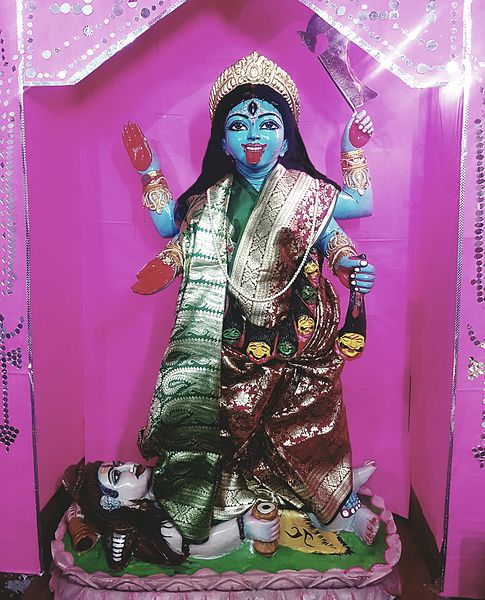Kali


Kālī also known as Kālikā (Sanskrit: कालिका), is a Hindu goddess. Kali is one of the ten Mahavidyas, a list which combines Sakta and Buddhist goddesses.
Kali's earliest appearance is that of a destroyer of evil forces. She is the goddess of one of the four subcategories of the Kulamārga, a category of tantric Saivism. Over time, she has been worshipped by devotional movements and tantric sects variously as the Divine Mother, Mother of the Universe, Adi Shakti, or Adi Parashakti. Shakta Hindu and Tantric sects additionally worship her as the ultimate reality or Brahman. She is also seen as divine protector and the one who bestows moksha, or liberation. Kali is often portrayed standing or dancing on her consort, the Hindu god Shiva, who lies calm and prostrate beneath her. Kali is worshipped by Hindus throughout India.
Kālī is the feminine form of kālam ("black, dark coloured"). Kālī also shares the meaning of "time" or "the fullness of time" with the masculine noun "kāla"—and by extension, time as "changing aspect of nature that bring things to life or death." Other names include Kālarātri ("the black night"), and Kālikā ("the black one").
The homonymous kāla, "appointed time", which depending on context can mean "death", is distinct from kāla "black", but became associated through popular etymology. The association is seen in a passage from the Mahābhārata, depicting a female figure who carries away the spirits of slain warriors and animals. She is called kālarātri (which Thomas Coburn, a historian of Sanskrit Goddess literature, translates as "night of death") and also kālī (which, as Coburn notes, can be read here either as a proper name or as a description "the black one"). Kālī is also the feminine form of Kāla, an epithet of Shiva, and thus the consort of Shiva